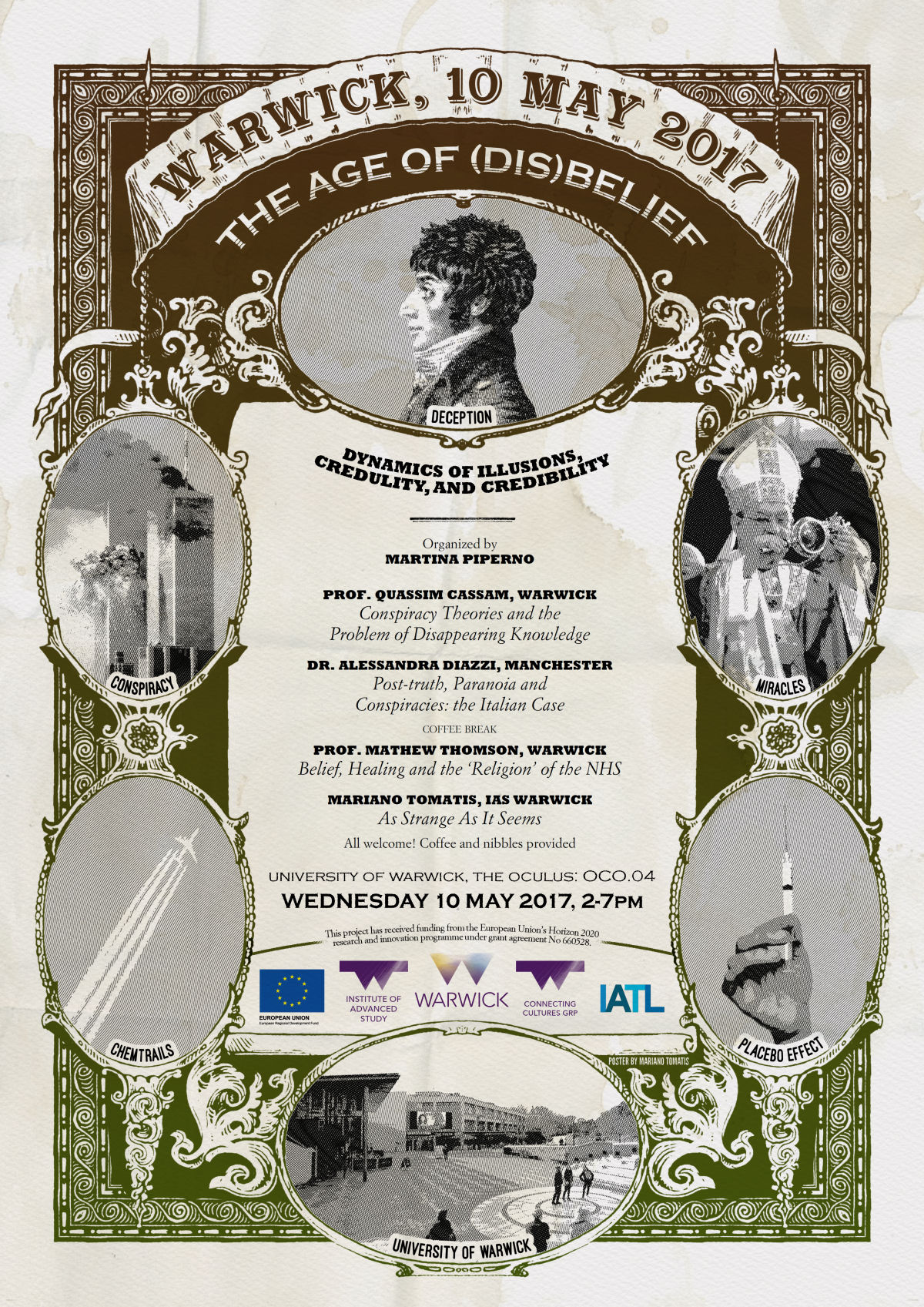Homepage University of Warwick
Mesmerized!
HOME / 10.5 The Age of (Dis)Belief. Dynamics of Illusions, Credulity, and Credibility
Wednesday 10 May 2017, 2:00pm-7:00pm
The Oculus: OCO.04, University of Warwick.
Organized by Martina Piperno.
Quassim Cassam (Warwick), Alessandra Diazzi (Manchester), Martina Piperno (Warwick), Mathew Thomson (Warwick), Mariano Tomatis (IAS Warwick).
The Age of (Dis)Belief. Dynamics of Illusions, Credulity, and Credibility

Conspiracy Theories and the Problem of Disappearing Knowledge
Prof. Quassim Cassam, Warwick
Knowledge depends on confidence and self-trust. For example, to know that aircraft impacts brought down the twin towers on 9/11 you need to be reasonably confident that this is what happened and you need to trust your ability to know such facts. Anything that undermines your confidence or self-trust also undermines your knowledge, and it is in this sense that conspiracy theories are a threat to knowledge. Conspiracy theories erode our confidence in our own beliefs and our trust in our ability to distinguish truth from lies. In philosophy, dogmatism is the view that it is sometimes rational to avoid or ignore potentially knowledge-undermining theories even if we don’t know how to refute them. I discuss the limitations of dogmatism in relation to conspiracy theories and make the case for a different approach.
Audio track of the speech (34”16’).
Post-Truth, Paranoia and Conspiracies: the Italian Case
Dr. Alessandra Diazzi (Manchester)
The speech aims to understand the notions of post-truth and conspiracy - two closely interwoven modes of disbeliefs - through psychiatric and psychoanalytic lenses. In particular, the speaker will propose to reflect on these questions by interpreting them as a paranoid style of thinking, to then establish a connection between conspiracy-based interpretations of reality and Freud’s understanding of trauma. After providing this theoretical framework, the speech will focus on the pervasiveness of conspiracy storytelling in Italian culture. Italy will be here taken as a paradigmatic case study to further explore non-clinical manifestations of pathological thinking in contemporary society.
Belief, Healing and the ’Religion’ of the NHS
Prof. Mathew Thomson (Warwick)
In the 1990s, former Conservative Chancellor Exchequer Nigel Lawson described the National Health Service as the closest thing the English people now had to a religion. It was a statement of frustration about the irrationality of public opinion, but it is an idea that has stuck and which has come to be vocalised by supporters and not just opponents. The politics of this description of the NHS as a religion, and the tensions between its use as vehicle for highlighting credulity or for defending credibility, provide the starting point for this paper. It then moves on to ask whether there is mileage in the idea at the heart of Lawson’s proposition, and if so what has been its effect: did the British people really believe in the NHS, as one believes in a religion, and has the movement been towards belief or disbelief as the institution itself has been radically reformed; how, if belief exists, was this faith created; what has been the effect of such belief when it comes to the ability and success of the NHS as a healing institution; and has the history of belief made the NHS different to other systems of healthcare provision in the modern world?
As Strange As It Seems
Mariano Tomatis, IAS Warwick
In the spirit of Enlightenment, 18th-century scientists tend to associate the concept of Enchantment with the superstitions of organized religions and the dogmatic authority of monarchical rule: the main goal for the Reason is to free individuals from being enthralled by such enchantments. Nevertheless, during the French Revolution, some masters of deception challenge the marginalization of mystery staging elaborate performances intended to evoke puzzlement and to keep minds in check. At the turn of the century, the Belgian magician Gaspard Etienne Robertson is the most successful one. The magic tricks, the anecdotes and the scams collected in his autobiography provide an interesting account of the mindset of that age, regarding the topics of illusion, credulity and credibility. During the lecture Mariano Tomatis cherrypicks five stories from Robertson’s Memoires, each one casting a light on the weirdest aspects of "The Age of (Dis)Belief".

Slides, script and audio track of Mariano’s lecture.

Photos of the event

Martina Piperno introducing the event "The Age of (Dis)Belief".

Prof. Quassim Cassam.

Dr. Alessandra Diazzi.

From left: Martina Piperno and Prof. Mathew Thompson.

From left: Mariano Tomatis and Martina Piperno.
Statistics 1 Online | 1 Today | 1 Yesterday | 5 Week | 33 Month | 61 Year | 1723 Total
